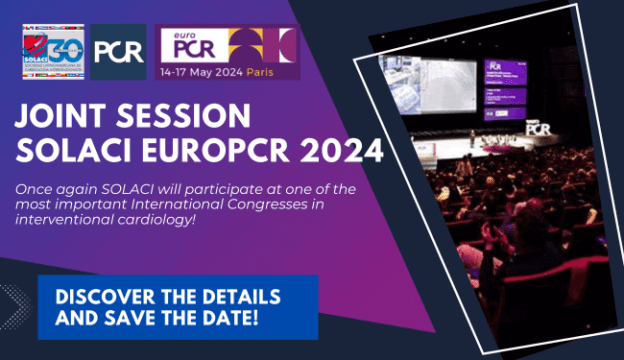Original title: Incidence and predictors of stent trombosis: a single-centre study of 5833 consecutive patients undergoing coronary artery stenting Reference: Javaid Iqbal et al. EuroInterventional 2013;9:62-69
Though potentially fatal, stent thrombosis is a low frequency event associated to stent malapposition, fractures, resistance to antiplatelet therapies, and diseases such as diabetes and kidney disease, among other factors. 5883 pacients were analyzed retrospectively; all patients underwent PCI between 2007 and 2010 at one center. 61% of patients were admitted with AMI and 2.1% presented cardiogenic shock at procedure. The number of implanted stents was 1.6/patient, 51% were DES. Follow up was at 700 days (341-1122).
109 patients (1.9%) presented stent thrombosis (70 definite and 39 probable). All cases of definite thrombosis were confirmed by angiography except for one that was confirmed by autopsy. 80% presented ST elevation AMI, the rest with unstable angina. In patients with probable ST thrombosis, 60% presented as death, 27% as infarction and 13% as unstable angina. Population mortality in this period was 6.1%, the highest presented with thrombosis (48.6% vs 5.3% p<0.001).
Independent predictors of probable or definite thrombosis were: cardiogenic shock, clinical presentation, lack of dual antiplatelet therapy, diabetes, stent length and diameter and three vessels disease. Cardiogenic shock was strongly associated with STEMI.
Conclusion:
Definite ST incidence in this real world registry is 1.9%. Cardiogenic shock is a strong predictor of stent thrombosis.
Commentary:
As controlled studies show (SCAAR, ESTROFA, etc), definite or probable ST in the “real world” continues to be lower than 2%, and lower than 1% when using Everolimus DES, but with high mortality rate. Cardiogenic shock is a particular situation, excluded from most studies, most certainly due to clinical and hemodynamic conditions. Correct stent implantation is essential to reduce stent thrombosis rates.
Courtesy of Dr Carlos Fava.
Interventional Cardiologist
Favaloro Foundation. Argentina.
Dr. Carlos Fava para SOLACI.ORG





